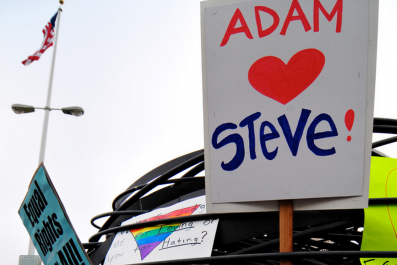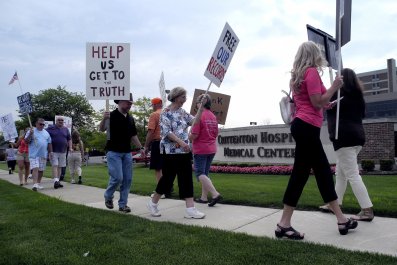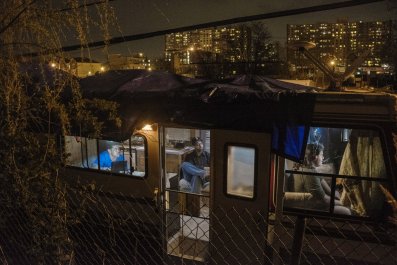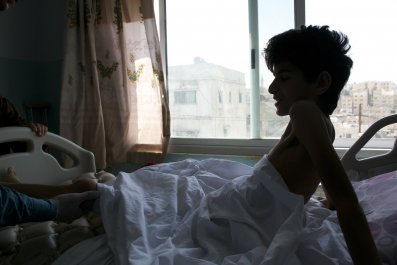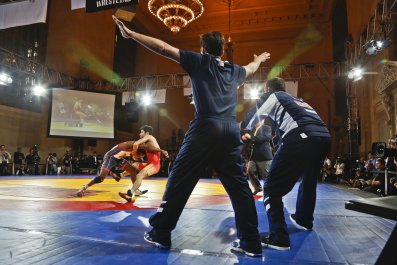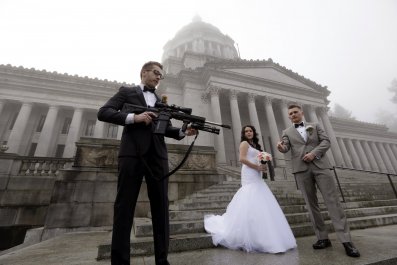On July 10, the 5th U.S. Circuit Court of Appeals in New Orleans heard legal arguments over President Barack Obama's controversial November executive order to delay the deportation of undocumented immigrants. As with most high-profile cases, the spinning began as soon as the court adjourned. U.S. Representative Joaquin Castro, D-Texas, was on the phone with reporters touting the benefits of keeping those immigrants in the country. He noted that many of the undocumented aliens brought to the U.S. as children thrived after Obama deferred their deportation and granted them work permits via a previous executive order, in 2012.
It's an economic rationale that strikes directly at the arguments laid out that day by the lawyers representing 26 Republican-led states, who sued the federal government late last year to block the second round of deferrals. That, the states argue, will place an undue financial burden on them.
Obama can't always count on his own party to have his back on immigration, though. Only a few weeks ago, that young San Antonio-area congressman (who, to make matters more confusing, is the twin brother of Housing and Urban Development Secretary Julian Castro) was speaking out against Obama immigration policies, albeit different ones. Congressman Castro had just visited two U.S. Immigration and Customs Enforcement detention centers (or "prison camps," as Illinois Representative Luis Gutiérrez describes them) holding thousands of Central American women and children who had crossed the border in the past year, seeking asylum from the violence choking the region. Castro warned that "people's lives are literally on the line."
Castro and fellow Democrats have been urging the White House to shut down two detention centers in Texas and one in Pennsylvania. There's also a lawsuit, filed in a U.S. District Court in California, to shut down those three facilities. The judge there has ordered the government to negotiate a resolution with the plaintiffs, with an agreement due in mid-July.
Such are the politics of immigration in America. Major chunks of Obama's immigration policy are being attacked by both the left and the right, which includes Donald Trump, whose blunt comments on Mexicans have caused business difficulties for him but boosted his polling in a muddled field of Republican presidential candidates.
The two court battles underscore the White House's own contradictions on illegal immigration. Its lawyers are fighting to block detention and deportation of family members in the case of millions of (mostly Mexican) immigrants who've been in the country for some time, while arguing that those same actions are necessary for the Central Americans who've recently crossed the border. This smoldering mess is not all Obama's fault: He's been stymied by a Congress that has stalled comprehensive immigration reform, and now his latest attempt to change the status quo through executive power is sputtering.
And the latest rhetoric about immigration is bordering on hysteria, with Trump tossing off incendiary quotes and stories about the murder of a young San Francisco woman by an undocumented alien running constantly on Fox News. That's not a promising environment for a president trying to make progress, even a little bit, on immigration reform before he leaves office next year.
Back in November, immigrant rights groups didn't get much of a chance to celebrate Obama's post-election executive order with the ungainly name: the Deferred Action for Parents of Americans and Lawful Permanent Residents, or DAPA. It was a bold move to shield 4 million-plus undocumented immigrants from deportation. Within weeks, more than a dozen Republican states had filed a lawsuit. By February, a Texas circuit court judge ordered an injunction, barring the administration from carrying the order out. The court date in New Orleans was to hear the federal government's appeal.
Liberals and immigrant rights advocates are standing with the Obama administration as the DAPA case winds through the courts, even as they fight him on another front. Family detention, part of the White House's response to the surge in Central American migrants during the summer of 2014, has become a flash point. The flood of unaccompanied minors and mothers with small children, most seeking asylum from violence back home, overwhelmed border guards and customs officials. The administration's somewhat panicked response was to reinstate a policy Obama had halted when he first came to office: locking up families.
Detention of people entering illegally, with or without children, has been a cornerstone of Obama's approach to illegal immigration from the start, however. A report released in May by the U.S. Conference of Catholic Bishops and the Center for Migration Studies noted that annual immigrant detention numbers have reached record levels under this administration. Since 1995, that number has more than quintupled, from roughly 85,000 people to 440,557 in 2013. But locking up families was a PR nightmare for the White House, with its Hispanic base and allies on Capitol Hill like Representative Castro.
The backlash to all these detentions and deportations has been building, however, and the White House has started making changes. As part of its big DAPA immigration announcement in November, the Obama administration also announced a new policy: "[T]hose who entered illegally prior to January 1, 2014, who never disobeyed a prior order of removal and were never convicted of a serious offense will not be priorities for removal," the Department of Homeland Security notes on its website.
And soon after Castro and seven other Democratic lawmakers visited the detention facilities, Homeland Security Secretary Jeh Johnson issued a statement promising reforms. Then, on July 13th, the Homeland Security Department announced it was beginning to release detained women and children who are eligible for U.S. asylum. In a statement, the department said that, "Going forward, ICE will generally not detain mothers with children, absent a threat to public safety or national security," as long as they meet the criteria for asylum and have a residential address they can stay at, instead of the detention center.
Activists are embracing that step, but they want more—they don't want any families locked up regardless of whether they're eligible for asylum or not. That's what they're fighting for in a District Court case, Flores v. Holder, playing out in Los Angeles. U.S. District Judge Dolly Gee issued a confidential tentative ruling in April, obtained by the McClatchy Co., that was highly critical of the administration's policy. She ordered the government to negotiate a resolution with the lawyers for the detained women that met the legal standards she outlined. The results of those negotiations, which have been under gag order, are expected to be presented to the court in mid-July.
Regardless of how it's resolved, Obama's family detention headache is likely to linger. Judy Rabinovitz, director of detention and federal enforcement programs at the American Civil Liberties Union's (ACLU) Immigrants' Rights Project, says the government may continue to fight the release of some mothers being held in the camps, even if forced to release their children. The existing law doesn't extend to the mothers directly, Rabinovitz points out. Then the question becomes: "Can they separate mothers and children?"
One Democratic congressman says the administration's hard line on the Central American immigrants surge is strategic: The White House hoped it would buy some breathing room on its executive orders benefiting undocumented immigrants who have already been in the country for years. In a 2014 meeting at the White House, the president basically said the administration had to be "tough on these new arrivals," the congressman says. "That was kind of the trade-off." The White House denies that.
Either way, it doesn't seem to have worked. Obama still has few friends among the "build the damn fence" set. One of the administration's chief Republican critics on this issue, Alabama Senator Jeff Sessions, blames Obama for the influx of Central American migrants that gave birth to renewed family detention. The surge of border crossers last summer is "a perfect example of the flawed fundamentals of the policy," Sessions tells Newsweek. "For months, the concern was always about how to help families coming unlawfully." Instead, Sessions says, the president should have sent a clear message at the beginning: "Please do not come with your children. This is going to be a disaster."
The former Alabama prosecutor is also one of the Republicans linking the administration's alleged leniency to the July 1 fatal shooting in San Francisco that's drawn a stream of headlines. Undocumented immigrant Juan Francisco Lopez-Sanchez shot Kathryn Steinle after he was released from a San Francisco jail in April. He'd been deported five times, but San Francisco is a "sanctuary city," meaning it has snubbed the feds on immigration enforcement. Critics have eviscerated the administration for not cracking down on sanctuary cities.
Immigrant rights advocates say the San Francisco slaying shouldn't be held up as a rationale for sweeping more people into the American legal system, despite Trump's bombast about Mexico exporting its criminals. They argue, instead, that it shows the need for systemic reform—something House Republicans blocked in 2013. And that truly is the root of all the legal knots, the finger-pointing and now the hand-wringing over sanctuary cities. The failure to overhaul America's immigration laws has left the Obama White House with contradictory policies, executive actions blunted by courts and no one happy, from the ACLU to Fox News pundits. Of all the manifold issues the next president will inherit, this may be the deepest policy morass of all.



